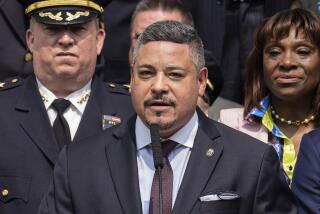Official’s Arrest Raises Query on Equal Treatment
- Share via
LONG BEACH — On Dec. 29, police officers spotted John Williams driving erratically. And as they would with anyone else, they arrested him on suspicion of drunk driving.
But even before the officers hauled Williams to the police station, routine procedure was changed.
Williams, 52, is deputy city manager, the third-highest ranking official in Long Beach. Unlike others taken into custody, he was not handcuffed. He was fingerprinted and photographed in a commander’s office instead of the regular booking area, police said. Chief Lawrence L. Binkley, who was called at home, arrived and witnessed the process.
Then Binkley drove Williams home.
The incident has stirred complaints of preferential treatment, and last month, a member of the city’s Public Safety Advisory Commission asked for a report from police on the department’s policy relating to the arrest of public officials.
On Wednesday, Police Cmdr. Charles Parks, who acts as a liaison to the commission, gave a one-minute verbal report summing up the department’s position in hopes of putting to rest an incident that police say has been blown out of proportion.
Policy Is Not in Writing
“The department’s policy is that all persons arrested are treated equitably,” Parks told the commission. If a case is brought to the attention of the chief, he can decide on a “case-by-case situation” how to handle it, he said. There is no written policy regulating the arrest of public officials, Parks said, emphasizing that everyone is treated fairly.
Commissioner Ron Nelson, who requested the report, said Thursday that the 13-member panel “really didn’t get an answer, except that when the chief hears of the arrest of anyone, he can act any way he wants.”
Nelson said the brief explanation from Parks “was a message in itself. It seemed to me that what they were saying is that it is a non-issue.”
“Everyone is supposed to be treated the same,” Nelson continued, “and if the chief wants to take special interest (he will) . . . It appeared to me that (the Williams case) was preferential treatment for a city official.”
Commissioner Marshall Blesofsky told Parks that there is concern in the community that some people are treated differently by police and if department policy is to treat everyone the same, “we should follow it.”
Police Cmdr. Robert Luman, chief of staff, said the Williams case “was handled differently but it was handled appropriately.”
Binkley has a policy that he be contacted whenever any Police Department employee or any city employee is arrested, Luman said. There has been no change in that policy, and if the same situation arises, it “could very well” be handled the same way, Luman said.
“I think what some people are upset about was that the chief drove him (home),” Luman said. “If someone they had worked with was arrested they would probably give him a ride also.”
Arrest Process the Same
Williams was photographed and fingerprinted like everyone else, Luman stressed. “We didn’t say, ‘Oh, you are Mr. Williams, you can go.’ No, he was brought down here . . . I think it’s only fair to stress that while these things may have occurred in a different location in the Police Department, everything routinely done to everybody else was done to Mr. Williams.”
“The press has handled it differently, also,” Luman noted. “There probably have been hundreds of drunk driving arrests and the press has ignored them.”
Leaders of the local chapter of the National Assn. for the Advancement of Colored People do not buy those arguments. In accusing the Police Department of racial discrimination last month, NAACP spokesman Frank Berry pointed to the Williams case as one example of “double standards.”
Williams has since pleaded guilty in Long Beach Municipal Court and been sentenced to three years of summary probation, (which means he does not have to report to a probation officer,) fined $777 and had his driver’s license restricted for 90 days. Williams has been deputy city manager since February of last year, when he returned to Long Beach after a seven-year stint with the county. Before that, he worked for Long Beach in various capacities for about 19 years. He has declined to comment on the issue.
Blesofsky was the only commissioner to comment on Park’s report during the Wednesday night meeting before Chairman Allan Tebbetts quickly moved to the next item on the agenda.
Under Different Purview
The next day, Tebbetts explained that the issue fell under the purview of the city manager, and not the commission, since it is the city manager who oversees the Police Department.
For that same reason, the commission recently was criticized by the City Council for recommending that its powers be expanded so it could also serve as a civilian police review board.
“I’m not sure what purpose it serves or what the effect might be” for the commission members to have discussed Williams’ arrest further, Tebbetts said. “My interest as chair is to look forward and move down the line, and I view that as a negative issue that I prefer to not deal with.”
Nelson said he would prefer to see that everyone who is arrested for drunk driving or other crimes go through the same “humiliating” process.
“Once people go through that one time,” Nelson said, “that could be part of the deterrent. They never want to go through that again.”
More to Read
Sign up for Essential California
The most important California stories and recommendations in your inbox every morning.
You may occasionally receive promotional content from the Los Angeles Times.













